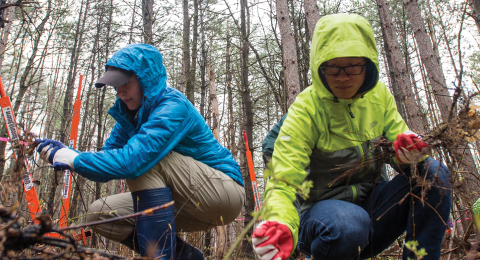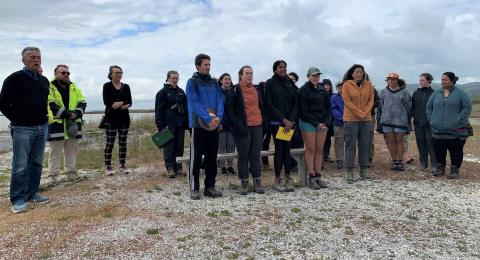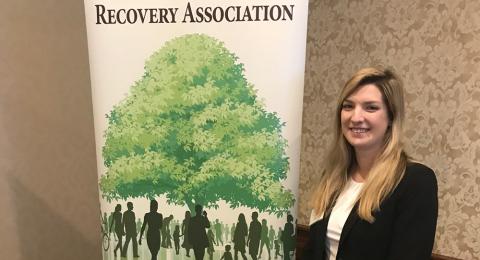The environmental and resource economics program is no longer accepting new students. We encourage students to consider one of our many related interdisciplinary degree programs such as community and environmental planning; environmental conservation and sustainability; environmental sciences: ecosystems; and environmental sciences: soil and watersheds.
Explore Program Details
Key Learning Objectives:
The Environmental and Resource Economics Program (EREC) offers training in environmental and resource economics, public resource policy, agricultural economics, and community economics. The curriculum emphasizes applied economics in a public policy context. Graduates are trained in critical, integrative, and evaluative thinking. The ability to integrate fundamental economic concepts and methods into logical decision-making is the program’s overall goal. Graduates are able to analyze and evaluate broad economic and social problems concerning allocation of individual, firm, and social resources.
We measure objectives according to proficiency in the following areas.
- THE LANGUAGE OF ECONOMICS - Students will learn basic concepts of microeconomics: scarcity, choice, opportunity cost, supply, demand, market structure, equilibrium, utility, costs, and profit. Students will understand how the optimizing actions of individuals and firms underlie demand and supply in markets, and how the resulting market equilibrium affects the welfare of consumers and firms, as well as how different market structures, technologies, and policies affect market equilibrium and welfare outcomes. Students will learn basic concepts of macroeconomics: inflation, monetary and fiscal policy, unemployment, business cycles, economic growth, comparative advantage, GDP, GNP, money supply, trade deficits and exchange rates, and how large sectors of the economy – government, households, business, and foreign trade – interact to determine overall levels of economic activity.
- DEPTH AND APPLICATION OF KNOWLEDGE- Students will acquire knowledge and skills to obtain a professional position or graduate training in the discipline. In addition to core skills from coursework, this includes the ability to recognize the economic implications of natural-resource and environmental issues, evaluate policy decisions, analyze data, identify major contemporary policy and management strategies, and bring relevant environmental issues into an economic context. Students will also be able to use appropriate quantitative methods to analyze economic, social, and environmental phenomena, and use these analyses to draw conclusions concerning effectiveness and policy implications.
- METHODS OF INQUIRY- Students will understand and use methods of inquiry appropriate to economics, leading to the ability to formulate and test hypotheses, recognize the shortcomings of different approaches, and determine the best method for specific problems. They will also know how to incorporate relevant biological and social data into economic analysis.
- PROBLEM-SOLVING- Students will use acquired skills to solve complex problems, gaining the ability to distinguish among different problem-solving strategies, use observation, experimentation, simulation, and models to gain knowledge, formulate and test hypotheses using environmental and economic data, recognize methodological limitations, build on present knowledge to develop appropriate problem-solving strategies, and evaluate results and refine strategies accordingly.
- MULTIDISCIPLINARY PERSPECTIVE- Students will recognize the value of, and participate in, multidisciplinary work, to understand the perspectives and scope of related disciplines, and to interact effectively with professionals in related fields. Students will become familiar with economic and ecological systems and how and why they change. They will understand the human dimensions of natural resource and environmental issues, and recognize that the diversity of human perspectives and their relationships to local and global ecosystem affect peoples’ practices, policies, and outcomes.
- COMMUNICATION – Students will be able to gather and interpret information from diverse sources. Students will refine their ability to communicate clearly and effectively including orally presenting ideas and knowledge clearly, writing logically and effectively for diverse audiences, and being able to convey complex ideas in environmental and resource economics to laypersons.
NOTE: This statement draws on previous work done by the University of Rhode Island, the University of Wyoming, and Washington State University.
What types of jobs or careers do most Environmental and Resource Economics (EREC) majors pursue?
Many of our students pursue jobs in local, state, and federal government, planning agencies, and NGOs, although quite a few end up in the private sector as well (especially banking). We have a good rate of placement in excellent graduate programs as well. The unemployment rate nationally for our field is less than 1%.
Is it possible to add a double major, dual major or minor and still graduate on time?
This is possible but requires you to take action fairly quickly in your academic career to make it happen. Working closely with your adviser is a must.
How big is EREC?
We have about 75 students in EREC.
Are there opportunities to work closely with faculty?
Yes! Our faculty advise our students, and we have an open-door policy. Many of our students work with our faculty on their research projects and the Undergraduate Research Conference.
Are there opportunities to study abroad within the EREC major?
Absolutely. Many of our students participate in the EcoQuest program in New Zealand, among others.
Can first-year students do research?
Yes.
Can students get paid for the time that they spend doing research?
Sometimes faculty members hire hourly student labor, usually in the summer.
What kind of internship opportunities are available for students to get experience in their area of interest?
Planning, local government, state agencies….
Other than office hours, are professors open and accessible?
We pride ourselves on our open-door policy. Many students have co-authored and presented professional papers with their professors.
What is the difference between EREC and the Economics major (ECON) in the Paul School on campus?
We work closely with our colleagues in the Paul School, and there is some substituting of courses between EREC and ECON. The biggest differences between the two programs are our focus (mainly environmental, community, and agricultural economics) and the extremely applied nature of our work.
Rigorous academic pursuit and hands-on learning from the mountains to the sea. Full immersion learning at a diversity of sites in the North and South Islands.
Xi Sigma Pi is facilitated through the UNH NREN department. Its goal is to unite likeminded individuals through service and fraternal spirit through a shared enjoyment of the environment. In addition, members receive recognition for their service by earning a cord to wear during graduation. Opportunities to take up leadership roles and give back to the NREN department are abundant.














